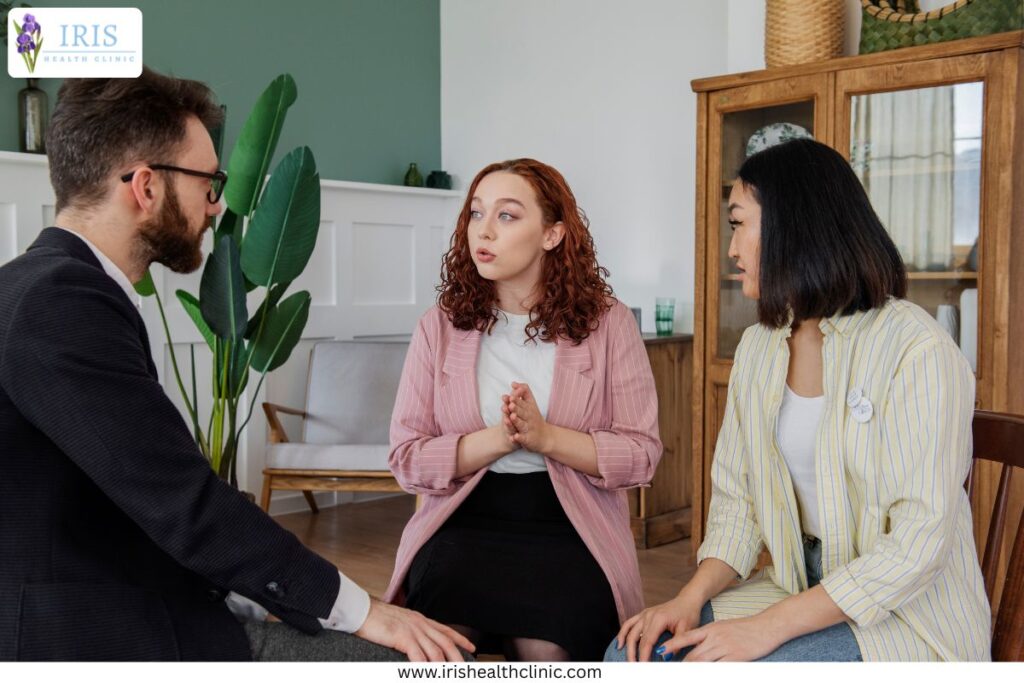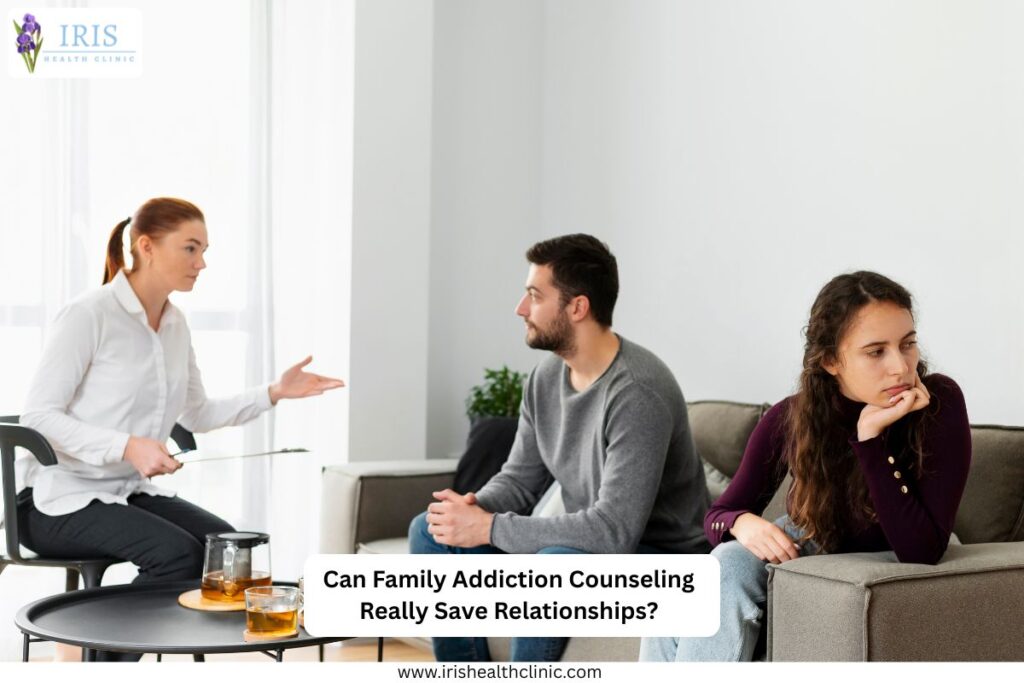The pain of addiction goes far beyond the person using substances. It destroys trust and fuels arguments. Family members often feel helpless. When someone struggles with addiction, everyone around them suffers. Addiction is a chronic disease affecting millions. According to SAMHSA, millions of Americans need treatment for a substance use disorder each year. Spouses, children, parents, and siblings can end up in a toxic environment. Communication breaks down. Families wonder if healing is even possible.
Fortunately, many families find a path forward with professional support. Family Addiction Counseling offers a safe, structured space to deal with the turmoil. It helps families rebuild trust, improve communication, and restore understanding. Support grows, and hope returns.
What Is Family Addiction Counseling?
Family addiction counseling is a special kind of therapy. It looks at addiction as more than just an individual problem. It treats it as a family disease. The whole family takes part in the recovery process. This therapy sees how one member’s actions affect everyone else. It works on healing relationships harmed by substance use.
A professional runs the family therapy sessions. They help the family spot and change unhealthy patterns. The aim is to build a supportive space that helps the person stay sober long-term. It also focuses on the emotional well-being of every family member.
Key components include:
- Education about addiction as a disease
- Learning how to set healthy boundaries
- Improving communication skills
- Addressing enabling behaviors
It is a collaborative effort. Everyone commits to making changes for the betterment of the whole family unit.
How Does Addiction Impact Family Relationships?
Addiction is a corrosive force. It eats away at the foundation of family life. The impact is deep and affects many areas.
- Trust is shattered: Lies and broken promises become normal. Family members cannot rely on the person struggling with addiction.
- Roles are distorted: Children might take on parental duties. Spouses may become enablers or act like constant detectives. This creates an imbalance and huge stress.
- Emotional turmoil reigns: Family members often feel anger, shame, fear, and guilt. Living with this stress can cause mental health problems, too.
- Financial instability: Addiction can lead to job loss or spending too much on substances. This puts the whole family under serious financial pressure.
- Isolation and secrecy: Families try to hide the problem from others. This keeps them from getting the help they really need.
Dealing with the hurt and problems caused by substance use is really important. That is why specialized support like family therapy for drug addiction is so necessary.
Can Counseling Really Repair Broken Bonds?
The good news is that, yes, counseling can absolutely repair broken bonds. Recovery is not just about the individual abstaining from substances. It is about the entire family finding a new way to interact and connect. Family addiction counseling provides the tools needed to facilitate this profound change.
Therapy helps family members work through their complex emotions. It gives them a safe space to share their pain and frustration. This is key to letting go of built-up resentment. It creates a place where real forgiveness and healing can start.
Family therapy sessions often introduce ideas from family trauma therapy. The therapist helps everyone see how past experiences, including the trauma of the active addiction, shape the way they act today.
Furthermore, counseling teaches crucial relationship skills. Family members learn how to:
- Communicate feelings honestly without blame.
- Listen actively and empathetically.
- Establish and maintain healthy boundaries.
- Support recovery without enabling.
The focus shifts from reacting to the addiction to actively supporting a healthy future. Families pick up new ways to cope and communicate. This helps them slowly rebuild trust and closeness. Going to family therapy regularly takes commitment. It is hard work, but the rewards are worth it.

What Techniques Are Used to Support Recovery?
Family addiction counseling uses a range of evidence-based techniques to tackle the complexity of addiction.
Common techniques include:
- Psychoeducation: Giving clear, factual info about how addiction works. Knowing that addiction is a brain disease, not a moral weakness, helps reduce shame and blame.
- Systemic Therapy: This approach sees the family as a connected system. The therapist points out how each person’s behavior affects the whole family. Changing one part can shift the whole dynamic.
- Motivational Interviewing: This helps boost the person’s motivation to change. It’s supportive and non-confrontational.
- Cognitive Behavioral Therapy (CBT): Family members learn to spot and change negative thoughts and harmful behaviors that feed the addiction cycle.
- Structural Family Therapy: This method works to reset family roles and build a healthy hierarchy. For instance, it makes sure parents are in charge, not the kids.
Another critical component is addressing co-occurring mental health issues. Addiction rarely travels alone. Family therapy for addiction counselors are trained to spot and address anxiety, depression, or other mental health challenges within the family unit.
How Do You Choose the Right Family Addiction Counselor?
Choosing the right therapist is an important step in the healing journey. You want a professional who knows addiction and family issues well. Searching for family counseling near me should focus on the right experience and credentials.
Here are key things to think about:
- Specialization and Certification: Check licensed counselors trained in substance use disorders and family systems.
- Experience with Addiction: Make sure the counselor has worked with families affected by addiction. This field needs special knowledge and understanding.
- Therapeutic Approach: Ask about the methods they use. Do they follow systemic or CBT approaches? Their techniques should fit your family’s needs.
- Logistics and Availability: Think about location and schedule. Can they offer flexible family therapy sessions that suit everyone?
- Comfort Level: All family members should feel safe and heard. A good connection with the counselor helps everyone open up.
Spending a little time up front can make a big difference in your long-term recovery.
Take the First Step Toward Healing Your Family Today
Addiction can really hurt a family. Sometimes it feels like the damage can’t be fixed. However, there is hope. Family addiction counseling gives families the structure and guidance they need to heal. It is not easy, but it can be life-changing. In therapy, families learn to talk openly, rebuild trust, and support each other. Professional help can actually save relationships and create a stronger, healthier family where recovery can grow.
At Iris Health Clinic, we aim to provide quality and affordable treatment for people and families in Wisconsin. Our centers are in Waukesha and Milwaukee, serving the larger southeastern Wisconsin area. We focus on substance use and mental health disorders. We offer many programs, including counseling for individuals, families, and couples.
FAQs
Q1: How long does the typical Family Addiction Counseling process take?
A typical course of treatment can differ a lot, but most family therapy sessions at Iris Health Clinic run for about 6 to 12 months. How much time it takes depends on the severity of the addiction and the family’s relationship issues.
Q2: Will the counselor tell the addicted family member they must seek individual treatment?
A skilled family therapy for drug addiction counselor will usually suggest that the person get their own care. Just like residential or intensive outpatient treatment.
Q3: Is it helpful if I go to counseling even if my addicted loved one refuses?
Absolutely. Many people feel real relief by going to family therapy for addiction, even when their loved one isn’t on board. It’s a key step for your own healing from past hurts. Sessions often use techniques from family trauma therapy. You learn healthier boundaries and coping skills.
Q4: What should I look for when searching for “family counseling near me”?
Do not just pick the closest option. Make sure the clinician takes your insurance and uses a systematic approach. Check reviews and credentials. It helps to choose someone who understands co-occurring mental health disorders.

